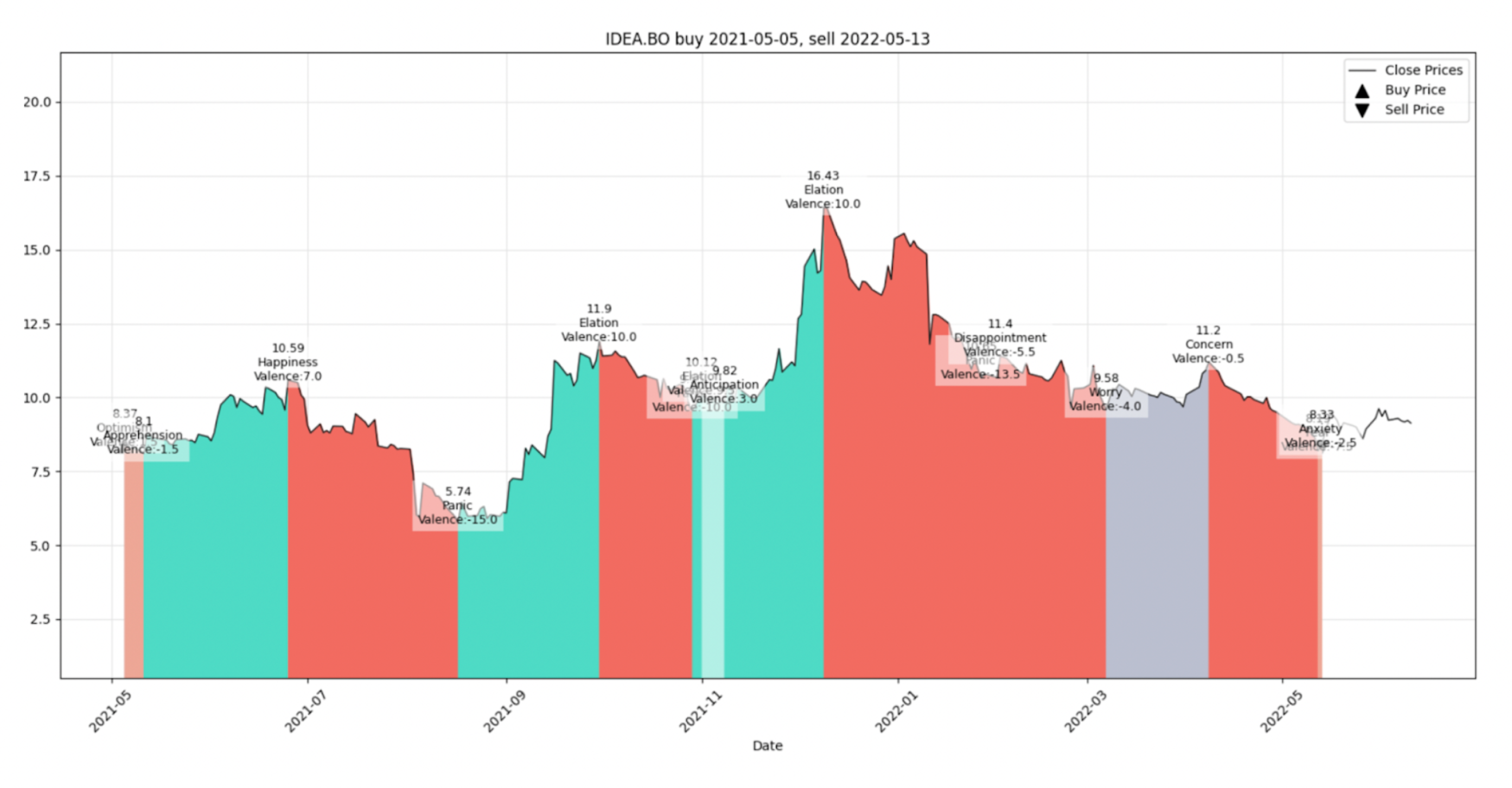What is BiasLens?
BiasLens is a revolutionary behavioural science and AI-powered tool designed to help one manage and harness the power of emotions. By identifying the patterns and behaviours driving our decisions, BiasLens empowers us to act with clarity and confidence in every market situation.
With BiasLens, one gains:
Emotion & Bias Clarity: Insights into how our emotions and biases have influenced our past decisions, thus diagnosing pervasive patterns to address.
Actionable Guidance: The BiasLens Reflect tool will gather investors preferences and send-making in different situations. This self-generated ideas, rituals, beliefs and goals would be used by BiasLens to Nudge our decisions in situations of vulnerability
BiasLens focuses on five key biases that impact investors, helping one manage and leverage them for better outcomes:

Clutching Declines:

Greed Chasing

Loss Chasing:

Ego Preservation:

Premature Harvesting
The Story of Rishi and Vodafone Idea: A Lesson in Clutching Declines
The trade ended with no apparent profit or loss, yet it reveals a deeper emotional journey and highlights a significant notional loss. The accompanying chart vividly captures the price movements and the investor's emotional states during this period.
The Emotional Journey
The chart illustrates the investor’s shifting emotional states—ranging from optimism and happiness during minor upticks to panic, disappointment, and eventually concern as the stock’s performance faltered. These emotions mirror the common pattern of Clutching Declines, a bias that traps investors in suboptimal decisions.

Despite repeated negative trends, Rishi stays in denial focussing on minor positive upticks to justify hope. As losses deepen, regret sets in, as does the fear of locking in those losses. Rishi also sub-consciously wants to avoid the effect the resulting loss would have on their self-image - all of which results in holding on to losing positions for far longer than would be ideal, much to Richi’s detriment. Like prospect theory explains, this bias is rooted in investors being risk seeking when it comes to losses, arguing that what goes down must go back up at some time in the future, and finally selling it when they can’t tolerate the losses and opportunity costs any more, by which time the losses have usually become deeper.
Master Emotions.
Makers of BiasLens

Rahul Mehta
Indian Capital Markets: Public Markets < Pre-IPO < Venture Studio
30+ years of Active Investing: Driven by a passion for investing, a curiosity to improve processes, and a commitment to challenge conventional views on market capitalizations
MentorCap Management / Spectrum Growth Partners, Banque Nationale de Paris, Corporate Database

Shubham Saraff
Shubham Saraff is a Tech Entrepreneur, Futurist, and Consultant who advises CIOs of VC funds and CEOs of leading companies, guiding them through the complexities of Emerging Technologies. Is the Co-Founder & Director of STAIR Digital. A recipient of the prestigious IET Global Award for his groundbreaking research on AI, Shubham is also a TEDx speaker on Artificial Intelligence, Future-Ready Products, Technology Trends, and Human Connectedness.
He holds a Master of Business Administration from the University of Oxford (Saïd Business School), where he served as the Co-Chairperson for the Technology Oxford Business Network. During his time at Oxford, Shubham also became an Investment Partner at the Oxford Syndicate Capital, a fund dedicated to investing in emerging technology companies worldwide.

Anurag Vaish
Anurag Vaish is a pioneer in leveraging behavioral and cognitive sciences to solve complex real-world challenges. As part of the Cofounding team of BiasLens, he brings decades of expertise in understanding human decision-making and designing innovative solutions that bridge the gap between intent and action.
Anurag is also the Co-Founder of Mentza, a live audio & AI platform focussed on helping transition the youth from academics to careers.
Anurag's journey spans entrepreneurship, consulting, and thought leadership. He is also the Co-Founder of Final Mile Consulting, where he introduced groundbreaking methods to address behavioral challenges in fields ranging from finance to public health. A sought-after speaker and mentor, Anurag is passionate about empowering individuals and organizations to harness the power of emotions and biases for better decision-making.
With BiasLens, Anurag's mission is to transform the way investors navigate the emotional dynamics of equity markets, turning biases & emotions into opportunities.

Anand Parameswaran
Anand is a behavioral sciences expert guided by a deep belief in the power of behavioral sciences to catalyze transformative change. As the cofounder of FinalMile Consulting (now a Fractal Analytics Company), established in 2008, Anand helped shape one of the world’s pioneering behavioral sciences design and consulting firms—recognized for its unique approach to solving complex challenges across both social and corporate sectors. He is currently the co-founder at Intem Labs, building products that bring together the transformative power of Behavioral Sciences and Artificial Intelligence.
Prior to his entrepreneurial journey, Anand built his career in sales and marketing across major organizations. Anand is an Electronics & Communication Engineer & an MBA in Marketing

Divya Balakrishnan
Divya Balakrishnan has over fifteen years of experience in the Behavioural Science and Design Consulting space, where she has lead teams that successfully integrate learnings from Behavioural Economics and Cognitive Science to solve complex strategic business problems across domains such as Financial Services, Development Sector, Safety and Retail.
She is a Computer Science Engineer and holds an M.Sc. in Cognitive and Decision Sciences from University College London and is one of the first few Behavioural Science graduates from India.

Fareesh Vijayarangam
Fareesh Vijayarangam is a full-stack developer, CTO and entrepreneur and has built hundreds of applications for over a decade.
At his current role as co-founder and CTO at Intem Labs, Fareesh is responsible for a host of products that combine the expertise of the behavioral science team and the best of what modern technology has to offer.
Prior to his entrepreneurial journey, Fareesh studied Software Engineering at the University of New Brunswick, Canada.

Jayal Shroff
Jayal Shroff is a seasoned design professional and behavioural science expert with 25 years of experience across branding, UI/UX, packaging, and behavioral interventions. As Co-Founder & Chief Design Officer at IntemLabs, Jayal applies behavioural science to enhance communication and career readiness. Previously, she has led life-saving interventions on Mumbai’s railway tracks, rebranded Air India, and worked with global brands like Unilever, Haldiram’s, and OLX. Jayal holds a Master’s in Design from Goldsmiths, University of London, and is passionate about using design to solve real-world problems.